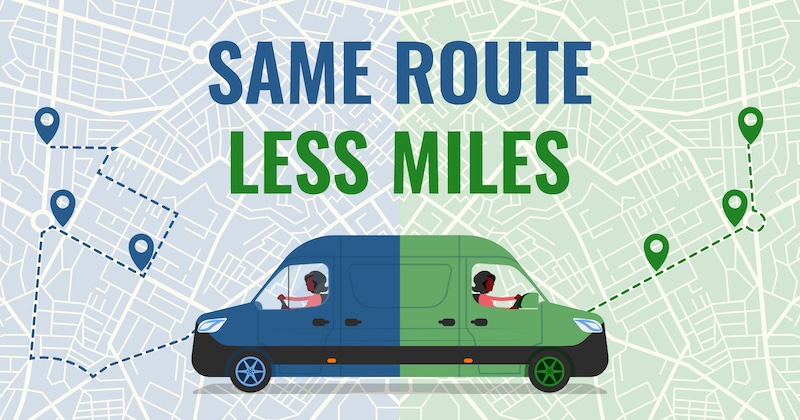
ESG – The New Frontier for Field Service Management
Last week, Steve Mason, VP of Customer Success at GPS Insight and World Business Research hosted Turning Plans into Action: 5 Strategies for Creating a Sustainable and Environmentally Friendly Future in Field Service, an in-depth webinar on the rising importance of sustainability and environmental, social, and governance (ESG) strategies in the field service industry.
The webinar featured key observations and results from the recent report sponsored by GPS Insight—ESG in Field Service: The Next Wave of Transformation—and included a Q&A with Alban Cambournac, VP, US Digital Services at Schneider Electric. You can watch the entire webinar when you have a moment, and below is a summary of the best discussion points to get you started.

The What and Why of ESG
So, what is ESG? According to TechTarget:
The ESG landscape has entirely transformed over the past two decades. Many investors, customers, and stakeholders have only recently begun to take an active interest in their assets’ social and environmental impacts. Sixteen years ago, only 63 investment companies were included in the 2006 United Nations Principles for Responsible Investment (PRI) report for incorporating ESG issues representing $6.5 trillion in assets under management (AUM). Jump to 2019, and 2,450 signatories representing $80 trillion in AUM reported ESG-driven investments.
According to PwC, 80% of investors now report that ESG considerations are a significant influence in their investment decisions, with 50% indicating they would withdraw from investments that did not take appropriate action.
Corporate Social Responsibility is now a critical piece of business operations, and businesses must be prepared to meet ESG goals. Creating and investing in an ESG strategy is no longer a “good to have,” it’s a “must have” to expand operations and grow revenue in the future.
The Fab Five ESG Questions
Q1. Why is emissions reduction so important?
According to the recent study conducted by GPS Insight and World Business Research, nearly half of Field Service Leaders consider reducing greenhouse gas emissions in their field service operations one of their most important ESG objectives. For most field service organizations, the biggest impact that they have environmentally is the size of their fleet. With extremely high fuel prices, reducing emissions is aligned with reducing costs, as well as benefiting the environment. Improving first-time fix rates, cutting out hold trips, minimizing unnecessary travel, and reducing the actual number of miles driven and fuel consumed reduces your carbon footprint and drives savings. The industry must do more to make that data more transparent and compatible with ESG reporting.

The dangers of climate change require reducing carbon emissions by 50% in the next 20 years. Everybody’s paying attention to it, whether it’s investors, employees, or customers. One way that we can reduce emissions in field service is by delivering services in a more digital way and, even better, in a remote way. This can be done by digitizing all the equipment installed at customer sites, making them connectable and connected so that network operating centers can monitor equipment remotely, anticipate issues, and alert customers.
Q2. How are field service leaders incorporating ESG reporting into their operations?
From the study ESG in Field Service: The Next Wave of Transformation, 35% of field service leaders are already using software for ESG reporting, and 43% are planning to adopt this in the near future. ESG reporting is a rapidly evolving field, and businesses need to find the right balance of tools to help reduce the cost of ESG.
The challenge is that ESG reporting is quite a loose framework. The more the field service industry can do to standardize reporting and create common metrics to measure sustainability improvements, the easier it will be for organizations to participate. Merging fleet and field data so that it not only provides insights in the business, but also produces the data in a format that can be transformed into high-level reporting, allows the information to be utilized across the entire organization.
Q3. From a field service perspective, what key advice will help organizations embarking on an ESG project?
to As a first step, do your research and leverage the resources available. For instance, Schneider Electric has published a guide to ESG reporting, which details best practices and key trends around the framework definitions for ESG and common reporting practices. It includes best practices in reporting, including how to engage stakeholders in the process.
Then, establish a baseline set of metrics that help you measure success in customer engagement and bring those metrics to a higher abstraction level to strategic decision making through the lens of ESG. For example, many service organizations have found that remote investigation work or customer self-service are strong strategies that bolster customer engagement and maximize efficiencies. ESG reporting will help your service organization reveal and understand how such approaches impact a larger ESG initiative and will give your service organization a leg up in the sales process.
As an industry, we need to consider how to best consolidate key data into a common set of metrics. Once that is achieved, it will be easier for customers to compare reporting and performance when choosing which organizations to work with.
Q4. Which field service technologies are most effective in helping FSM companies reach their sustainability goals?
5G technology
Self-service technology
Smart scheduling and routing
Q5. Does implementing technology like this help a business’ bottom line?
In short: yes.
The first thing field service companies need to do is determine the current cost of delivering the business service. This is critical to have a starting point as a point of comparison. Then you need to identify and quantify what the gains are going to be when you implement the technology. If you change processes, and then report on that to get your data, you’ll start to understand the return on investment.
The key is to start benchmarking upon implementation. You’ll then have a clear understanding of your reporting capabilities with your new technology and process so that you can report on the benefits. Once you establish a benchmark, then adjust your processes over time to optimize the use of that technology. And of course, show how you’re continuing to make improvements by strengthening the technology that you have.
Remember to think beyond the obvious stakeholders. Perhaps your company is focusing on ESG reporting primarily for your investors, but think also about the impact of communicating what you’re doing from a sustainability standpoint to your customers. How does this help your brand? How does this help your image? Last, don’t forget your employees. Sustainability is a very strong selling point with new hires, particularly younger workers.
Watch the on-demand webinar
Is ESG becoming a hot topic at your organization? Learn from the experts by watching the full discussion with GPS Insight and Schneider Electric.






